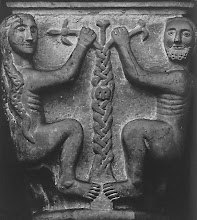(p. 68) “After Midnight, the Fifth Month,” Jacqueline Osherow
I am becoming a cathedral! My
Belly rises from the bed like a tiny
Model of the Florence Cupolone.
Probably a belly just like this
Inspired Brunelleschi’s great design:
The original, the perfect, home.
There is a tapping from the inside,
Gentle, almost imperceptible,
Like piano hammers touching piano strings.
And I am fluent in these first attempts
At language; I am turned to someone else.
There is life beyond our own. Gabriel
Whispers, softly fluttering his wings,
With every touch a hushed annunciation.
She’s so exuberant! And I can see the domed womb like a cathedral dome—the cathedral dome like a domed womb and I agree—they are the same in some deep way—a holy enclosure. I like the idea of those first soft flutterings as piano hammers—touches that soft and light. The line “I am turned to someone else” says at least two things at once: 1) I’ve changed into a different person, and 2) my deepest focus has turned from myself to this new life in me. I love poetry when it carries all the meanings of its words at the same time—so each sentence reverberates and changes slightly, reinforcing or modifying itself with each reverberation. In everyday speaking we usually employ words so half-heartedly, like sieves with most of the meaning dripping out, hoping people will get the general drift of what we’re saying. I think the lost language of paradise has more to do with the care and spirit in which we speak whatever we do speak than with the actual vocabulary and grammar heard in Eden.
skip to main |
skip to sidebar


All text (excluding quoted poems and comments) within Matter | Pattern by Emma J is licensed under a Creative Commons Attribution-Noncommercial-Share Alike 3.0 United States License.
living with poetry
"Let our words be as necessary and useful as once were words of magic.
This is an unachievable ideal."
Anna Swir (1909 - 1984)
This is an unachievable ideal."
Anna Swir (1909 - 1984)
. . . . and elsewhere
Matter | Pattern

matter [ME matere, fr. OF matere, matiere, fr. L materia] tree trunk (<"matrix," the tree's source of growth) matter, subject, physical substance, wood for building, fr. mater mother
mother Based ultimately on the baby-talk form ma- 2 [Indo-European ma - 1 <"good" with derivatives meaning "occurring at a good moment, timely, seasonable, early, ripe" ; ma- 2 <"breast" an imitative root derived from the child's cry for the breast, a linguistic near-universal found in many of the world's languages; ma- 3 <"damp ") [ME moder, fr. OE modor, akin to OHG muoter, ON mothir, L mater (maternal, maternity, matriculate, matrix, matron), Gk meter (metro-, metropolis [<"mother city]; Demeter [< "god-mother"], Skt matr]
meter [ME meter, metre, fr. OE & MF, fr. L metrum, fr. Gk metron (<"measure" ) fr. IE root me-] meter, metrical, diameter, geometry, metronome. Suffixed forms mens, men-ot (<"moon, month") an ancient and universal unit of time measured by the moon (menarche, meniscus, menopause, menses, menstrual, bimester, semester, trimester).
poetry [fr. ME poet, poete fr. OF poete, fr. L poeta, fr. Gk poietes, poetes <"maker, composer, poet, fr. poien to make, do , create, compose"] akin to Skt cinoti <"he gathers, heaps up, piles in order," OSlav ciniti <"to arrange, to pile up"
padre from papa, a child's word for "father," a linguistic near-universal found in many languages. [IE root pa- <"to protect, feed" (fodder, forage, pabulum, food, foster, pasture, repast, pastor <"shepherd, protector") (ME fader, fr. OE faeder; akin to OHG fater, ON fathir, Goth fadar, L pater, Jupiter [<"god-father"], patrare [<"to bring about"]; Gk pater, Skt pitr) patrician, patrimony, patron, pater, paternal
pattern [ME patron, fr. MF, fr. L patronus (<"master, pattern") fr. L defender, protector, advocate, fr. patr-, pater (<"father") a fully realized form, original, or model accepted or proposed for imitation, archetype, exemplar.
mother Based ultimately on the baby-talk form ma- 2 [Indo-European ma - 1 <"good" with derivatives meaning "occurring at a good moment, timely, seasonable, early, ripe" ; ma- 2 <"breast" an imitative root derived from the child's cry for the breast, a linguistic near-universal found in many of the world's languages; ma- 3 <"damp ") [ME moder, fr. OE modor, akin to OHG muoter, ON mothir, L mater (maternal, maternity, matriculate, matrix, matron), Gk meter (metro-, metropolis [<"mother city]; Demeter [< "god-mother"], Skt matr]
meter [ME meter, metre, fr. OE & MF, fr. L metrum, fr. Gk metron (<"measure" ) fr. IE root me-] meter, metrical, diameter, geometry, metronome. Suffixed forms mens, men-ot (<"moon, month") an ancient and universal unit of time measured by the moon (menarche, meniscus, menopause, menses, menstrual, bimester, semester, trimester).
poetry [fr. ME poet, poete fr. OF poete, fr. L poeta, fr. Gk poietes, poetes <"maker, composer, poet, fr. poien to make, do , create, compose"] akin to Skt cinoti <"he gathers, heaps up, piles in order," OSlav ciniti <"to arrange, to pile up"
padre from papa, a child's word for "father," a linguistic near-universal found in many languages. [IE root pa- <"to protect, feed" (fodder, forage, pabulum, food, foster, pasture, repast, pastor <"shepherd, protector") (ME fader, fr. OE faeder; akin to OHG fater, ON fathir, Goth fadar, L pater, Jupiter [<"god-father"], patrare [<"to bring about"]; Gk pater, Skt pitr) patrician, patrimony, patron, pater, paternal
pattern [ME patron, fr. MF, fr. L patronus (<"master, pattern") fr. L defender, protector, advocate, fr. patr-, pater (<"father") a fully realized form, original, or model accepted or proposed for imitation, archetype, exemplar.
Blog Archive
-
▼
2007
(31)
-
▼
November
(25)
- “Winter Verse for His Sister,” by William Meredith
- from "Three Poems for a Twenty-Fifth Anniversary,"...
- “Sent to Her Elder Daughter from the Capital,” by ...
- “September, the First Day of School, #1,” by Howar...
- “For a Five-Year-Old,” by Fleur Adcock
- “Night Terrors,” by Alan Shapiro
- “Instinct,” by C.K. Williams
- "To my Daughter" by Stephen Spender
- "A Cradle Song" by W.B. Yeats
- "The Tempest - to my daughter Miranda" by Stephen ...
- "Morning Song" by Sylvia Plath
- "Five a.m., the Ninth Month" by Jacqueline Osherow
- "After Midnight, the Fifth Month" by Jacqueline Os...
- "Infertility" by Edward Hirsch
- "My Husband before Leaving" translated by J. Mouss...
- "Lesson" by Forrest Hamer
- "Letter of Recommendation" by Yehuda Amichai
- "Those Winter Sundays" by Robert Hayden
- "I Ask my Mother to Sing" by Li-Young Lee
- "Clearances" by Seamus Heaney
- "Portrait of my Mother on Her Wedding Day" by Celi...
- "The Journey," by David Ignatow
- "Nikki-Rosa," by Nikki Giovanni
- A Poem a Day for 30 Days: #1“There Was a Child Wen...
- Where I'm Coming From: Biases and Blindspots
-
▼
November
(25)
I am

All text (excluding quoted poems and comments) within Matter | Pattern by Emma J is licensed under a Creative Commons Attribution-Noncommercial-Share Alike 3.0 United States License.

